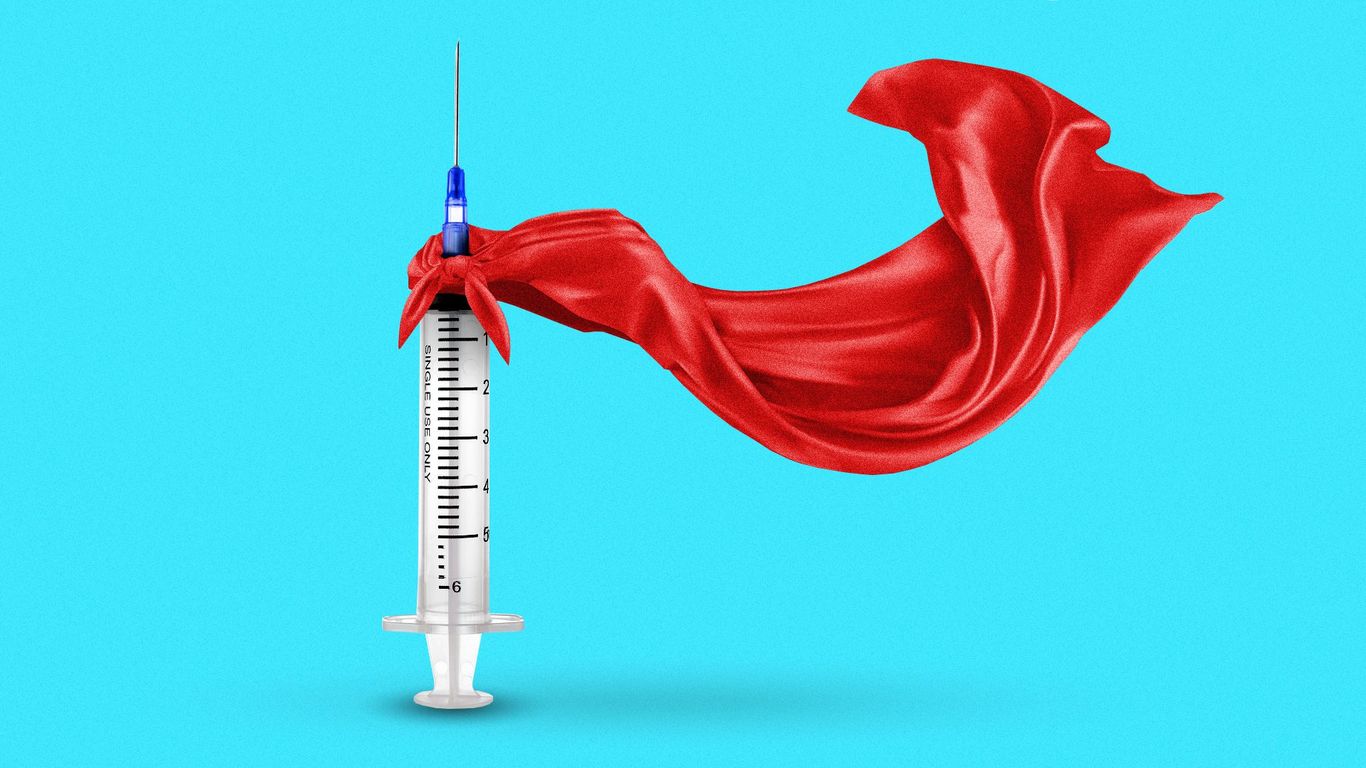
No matter how hard you squint or what angle you look at it, the coronavirus vaccines are a triumph. They save lives today; they will help end this pandemic eventually; and they will pay scientific dividends for generations.
The big picture: The pandemic is not over yet. There are still major threats to come and major problems to be resolved. But despite all the things that have gone wrong in the past year, the vaccines themselves have shattered even the most ambitious of expectations.
The vaccines represent an “astonishing scientific achievement for the world … unprecedented in the history of vaccinology,” said Dan Barouch, a virology and vaccines expert at Harvard who worked on the Johnson & Johnson vaccine.
Details: Developing a vaccine takes an average of 10 years – if it works at all. Despite years of well-funded research, there are still no vaccines against HIV or malaria, for example.
- We now have multiple COVID-19 vaccines, all developed in less than a year.
- The Pfizer and Moderna vaccines are the world’s first successful mRNA vaccines – which, to put it simply, teach our bodies to raise an immune response without relying on attenuated or inactivated viruses. It is a milestone that scientists have been working towards for 30 years.
- Moderna’s vaccine is the company’s first licensed product of any kind.
Most importantly, all leading vaccines work extremely well.
- All four vaccines or vaccine candidates in the US – from Pfizer, Moderna, AstraZeneca and Johnson & Johnson – appear to prevent deaths from the coronavirus and provide complete or nearly complete protection against serious disease.
- Some vaccines are more effective than others in preventing mild or asymptomatic infections, but all significantly exceed the FDA threshold to be considered effective.
The catch: On Sunday, South Africa stopped distributing the AstraZeneca vaccine because it turned out not to work against the dangerous variant discovered there – which is spreading around the world.
- The other vaccine manufacturers have also said their products are not as effective against the South African variety.
But that’s one reason for the rest of the world to lean into existing vaccines, and not be wary of them.
- Viruses can mutate when they spread widely. The best defense against widespread variants is to vaccinate as many people as possible and increase social distance to control the virus.
- Drug makers may need to develop booster shots or new prescriptions to deal with variants, but waiting for a vaccine that targets each variant will only leave the door open for more variants.
Our biggest problems are not with the vaccines, but rather with the processes surrounding them.
- Stocks must increase; distribution must become much more efficient; we need to get people to get their second photos, if applicable; and people must be willing to get vaccinated once they become eligible.
- That’s a long and difficult to-do list, and if you do those things wrong, the pandemic could be away for years. But if we can get the process right, the vaccines themselves are powerful enough to do the job.
Once the history of this is written, they will be cited as one of the greatest scientific achievements, ”Zeynep Tufekci, a University of North Carolina sociologist with a track record of knowledge of the coronavirus, told Ezra Klein to The New York Times.
- “It’s like a national celebration and fireworks and church bells and things,” she said.
This was no wonder and it did not happen overnight. “What we’ve seen in the past year is the culmination and culmination of decades of scientific progress,” said Barouch.
- Researchers have been building mRNA-based vaccines for about 30 years, fueled by broader advances in genetic science.
- Those same advances have also greatly accelerated genetic sequencing – which is why researchers were able to map the structure of COVID-19 within weeks of the virus’ discovery and then work on potential vaccines.
What’s next: The vaccination race is one of the few areas of this entire pandemic where the US and the world will be able to learn from our successes rather than our failures.
- The breakthrough of successful mRNA vaccines, scientists hope, will pave the way for a new generation of products that are more effective and easier to develop than previous vaccines.
- Bringing money to vaccine developers and establishing early, step-by-step communication with regulatory authorities has also accelerated this process and can once again help in future pandemics.
It comes down to: “Great funding, great science, and great collaboration with the regulators – that’s how they could do something I didn’t think could be done in a year,” said Mark Slifka, a professor of immunology at Oregon Health & Science University.